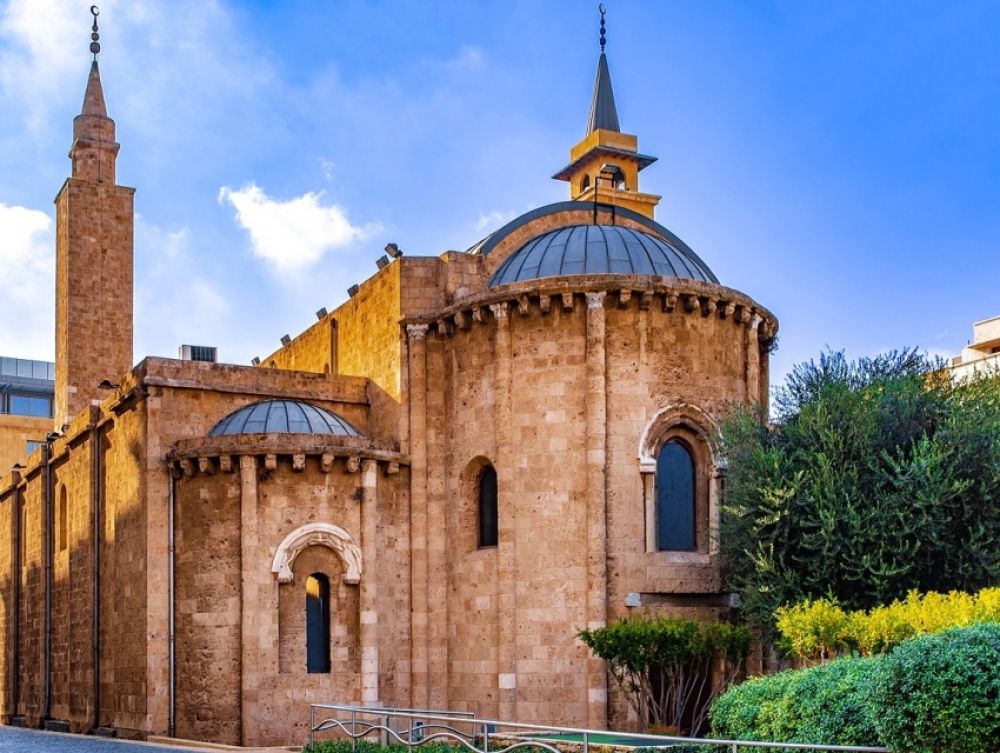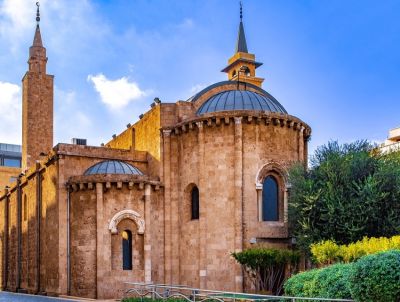

Embark on a historical journey through the Al Omari Grand Mosque, an architectural gem that stands as a testament to the city's rich past. Originally a Byzantine church dedicated to Saint John the Baptist, it was converted into a mosque by the Mamluks in the 13th century. Visitors can marvel at the blend of Byzantine and Islamic architectural elements, including the grand arches, robust columns, and striking minaret. The mosque was heavily damaged during the Lebanese Civil War but has since been beautifully restored, allowing you to appreciate its full grandeur. Throughout the tour, learn about the mosque's significance to the local community, its role in Beirut's history, and its resilient spirit in the face of conflict. This activity offers a reflective and educational experience for those interested in architecture, history, and culture.
Experience an evening of spirituality and tranquility at the Al Omari Grand Mosque during the sunset prayer, known as Maghrib. Visitors are provided with an opportunity to observe or participate in one of the five daily prayers in the Islamic tradition. The symphony of the adhan (call to prayer) followed by the collective worship creates a serene atmosphere, inviting a moment of introspection and peace. Witnessing the prayer offers insight into the religious practices and the importance of the mosque as a community center. This activity is not only for those who practice Islam but also for those who wish to understand and respect the cultural practices of others. Modest attire is required, and women are typically expected to cover their heads. This authentic encounter is suitable for all interested in cultural immersion and interfaith dialogue.
Capture the beauty of the Al Omari Grand Mosque with a photography session that immerses you in the artistry of the structure and its surroundings. The mosque’s intricate details and historical context provide a rich tapestry for photographers of all skill levels. Participants can photograph the mosque's exterior with its striking minaret and robust columns reminiscent of its church origins. Inside, delicate calligraphy, ornate mihrab, and expansive prayer hall offer countless angles and elements to explore. Whether a professional or a hobbyist, the mosque's aesthetic allure and ambient lighting, especially during the golden hours, ensure a rewarding experience. Photography enthusiasts should respect the sanctity of the space, avoiding sessions during prayer times unless permission is granted.
The Al Omari Grand Mosque serves as a hub for cultural and religious dialogue, where people of all backgrounds can come together to learn and exchange ideas. Engage in sessions organized by the local community or mosque authorities that focus on promoting understanding and unity among diverse groups. Topics might range from exploring the commonalities among different faiths to discussions on fostering peace and community development in a post-conflict society. These dialogues are often led by knowledgeable speakers, including religious leaders and scholars. By participating, you contribute to building bridges between various cultural in Beirut and beyond, fostering a spirit of coexistence. This enriching experience is aimed at open-minded individuals keen on intercultural communication and societal growth.
Delve into the world of Islamic art and architecture with this educational activity at the Al Omari Grand Mosque. Led by experts in the field, you’ll explore the mosque's design elements that epitomize Islamic aesthetic principles, such as intricate arabesque patterns, calligraphy, geometrical shapes, and the use of light and space. Understand the symbolic meanings behind the art and how it enhances the spiritual ambiance of the mosque. The tour also covers the historical transition from a Byzantine structure to an Islamic place of worship, shedding light on the cultural and religious shifts in Beirut. Participants will leave with a broader knowledge of Islamic contributions to world heritage, the significance of architectural preservation, and the influence of religious art in everyday life. Suitable for learners, art enthusiasts, or anyone with a curiosity about global cultures.
Al Omari Grand Mosque organizes special workshops tailored for young minds to learn about Islamic culture and the significance of the Mosque in a fun and engaging way. These activities range from storytelling sessions that regale tales of the mosque's history and the various civilizations that left their mark on it to simple calligraphy classes where children can try their hand at Arabic script. Interactive tours of the mosque are designed to suit children's curiosity and attention spans, making it a lively learning experience. By creating an inclusive environment where children from different cultural backgrounds can come together, the mosque promotes mutual understanding from an early age. Workshops are typically run by experienced educators who are skilled at working with children in an educational setting.
During the holy month of Ramadan, the Al Omari Grand Mosque transforms into a nightly festival of spirituality and community. Visitors can experience the special Taraweeh prayers held after the last daily prayer (Isha), where long portions of the Qur'an are recited across the nights of the month. It's a powerful experience, with rows of worshipers standing in prayer, and the recitations echoing throughout the mosque's expansive architecture. Additionally, guests can enjoy Iftar, the meal to break the fast at sunset, often provided for the public. It's a time of generosity and communal bonding, where individuals from all walks of life come together to share in the meal and engage in acts of charity. Cultural talks, Quranic study circles, and youth activities are also part of the Ramadan event calendar at the mosque.
Witness the timeless art of Arabic calligraphy at exhibitions hosted by the Al Omari Grand Mosque. Frequently featuring prominent local and international calligraphers, these exhibitions showcase stunning artworks that integrate spiritual texts with artistic expression. Visitors can admire pieces that range from classical styles to contemporary interpretations, each offering a unique perspective on this important Islamic art form. The intricacy and beauty of the calligraphy encourage reflection on the power of language and its role in religious and cultural identity. Interactive elements, such as live demonstrations or workshops, allow you to observe calligraphers at work or even try your hand at the craft. These exhibitions are a testament to the enduring legacy of calligraphy in Islamic culture and its relevance in modern artistic endeavors.
In the spirit of inclusivity and sharing, Al Omari Grand Mosque opens its doors to people of all faiths for an interfaith Iftar during Ramadan. This evening meal, which breaks the daily fast, is a wonderful opportunity for guests to partake in traditional Lebanese cuisine while engaging in conversations about religious customs, fasting practices, and the values of empathy and compassion that underpin the observance of Ramadan. The event is organized to foster understanding and harmonious relationships between different religious communities. Participants share food and stories, creating memories and friendships that often last beyond the meal. The breaking of bread together serves as a powerful symbol of unity in a country known for its cultural and religious diversity.
Find inner peace and spiritual connection with guided meditation sessions at the Al Omari Grand Mosque. Set in a serene environment, these sessions are designed to help participants relax, reflect, and reach a deeper state of mindfulness. Led by experienced facilitators, you'll be guided through various techniques that draw from Islamic meditative and spiritual practices. The mosque provides a tranquil backdrop for contemplation, enhancing the meditative experience with the sound of flowing water from its fountains and the soft echo of prayers. Whether you are a seasoned practitioner or a beginner, the session can be a profound journey of personal growth and connection to the divine. These sessions aim to promote inner harmony and understanding through the universal practice of meditation.
